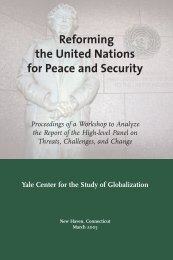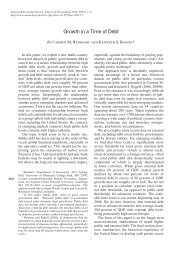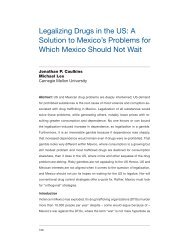The collapse of global trade, murky protectionism, and the crisis:
The collapse of global trade, murky protectionism, and the crisis:
The collapse of global trade, murky protectionism, and the crisis:
You also want an ePaper? Increase the reach of your titles
YUMPU automatically turns print PDFs into web optimized ePapers that Google loves.
<strong>The</strong> <strong>collapse</strong> <strong>of</strong> <strong>global</strong> <strong>trade</strong>, <strong>murky</strong> <strong>protectionism</strong>, <strong>and</strong> <strong>the</strong> <strong>crisis</strong><br />
ings agencies won't help here as such counterparty risk tend to be "biased" against<br />
developing countries risk.<br />
Measures proposed by <strong>the</strong> private sector<br />
<strong>The</strong> Banker's Association for Trade <strong>and</strong> Finance <strong>and</strong> o<strong>the</strong>r commercial bankers have<br />
proposed <strong>the</strong> three following measures.<br />
• Change <strong>the</strong> Basel II rules.<br />
In view <strong>of</strong> <strong>the</strong> positions developed by both bankers <strong>and</strong> <strong>the</strong> Bank for International<br />
Settlements (BIS) on <strong>trade</strong> finance, <strong>the</strong> WTO Expert Group on Trade Finance has considered<br />
that <strong>the</strong> best course for bankers would be to make a case for <strong>the</strong>mselves on<br />
low default <strong>and</strong> <strong>the</strong> self-liquidating nature <strong>of</strong> <strong>trade</strong> finance, through a survey to be<br />
conducted by <strong>the</strong> International Chamber <strong>of</strong> Commerce (ICC) on historical data – a<br />
survey which is underway <strong>and</strong> is to be presented at <strong>the</strong> March 18 Expert Group meeting<br />
at <strong>the</strong> WTO. Some regulators (such as <strong>the</strong> FSA) are currently discussing with representatives<br />
<strong>of</strong> <strong>the</strong> banking industry, <strong>and</strong> it seems that some smaller requests <strong>of</strong><br />
bankers could be accommodated (this benefits only to banks regulated by <strong>the</strong> FSA,<br />
though, it needs to be agreed <strong>global</strong>ly.<br />
• Introduce a ring-fenced liquidity fund for <strong>trade</strong> finance.<br />
Here it is important to look at <strong>the</strong> nature <strong>of</strong> proposals. Some national Treasuries are<br />
unconvinced that a large, sector-specific liquidity fund would be efficient, or fair from<br />
a competition point <strong>of</strong> view. At <strong>the</strong> recent WTO <strong>trade</strong> finance conference, <strong>the</strong>ir representatives<br />
argued that taxpayers would not accept paying once for <strong>the</strong> overall liquidity<br />
injection into cash-strapped banks, <strong>and</strong> again for a special <strong>trade</strong>-finance vehicle<br />
– especially since such a vehicle would trigger dem<strong>and</strong>s for similar things from<br />
o<strong>the</strong>r credit market segments.<br />
<strong>The</strong> <strong>trade</strong> finance departments <strong>of</strong> banks, it was said, need to compete better internally<br />
for <strong>the</strong> extra cash provided by central banks. <strong>The</strong> problem is not one <strong>of</strong> overall<br />
lack <strong>of</strong> liquidity but one <strong>of</strong> allocation <strong>of</strong> it, certain institutions remaining overly liquid<br />
<strong>and</strong> having significant room for intervention. It should not be forgotten, that in<br />
competitive banking markets, <strong>the</strong> best run banks are already anticipating a future<br />
banking l<strong>and</strong>scape where several <strong>of</strong> <strong>the</strong>ir competitors would have disappeared.<br />
However, <strong>the</strong> design <strong>of</strong> much smaller, better targeted <strong>and</strong> experimental liquidity<br />
funds, run by international financial institutions, for smaller segments <strong>of</strong> <strong>the</strong> market<br />
or new countries, in particular those which most likely to be hit by <strong>the</strong> contraction<br />
<strong>of</strong> supply (for example in least-developed countries' markets), is currently underway.<br />
• Encourage more risk-sharing with public sector-backed institutions.<br />
This proposal is also advocated by <strong>the</strong> WTO <strong>and</strong> international financial institutions.<br />
<strong>The</strong> idea would be to mobilise public-sector actors, such as Export Credit Agencies<br />
<strong>and</strong> <strong>the</strong> Regional Development Banks, in <strong>the</strong> effort to shoulder some <strong>of</strong> <strong>the</strong> privatesector<br />
risk as well as encouraging co-financing between <strong>the</strong> various providers <strong>of</strong> <strong>trade</strong><br />
finance. With <strong>the</strong> support <strong>of</strong> WTO members, <strong>the</strong> WTO Director-General has adopted<br />
a two-step approach in WTO Expert Group for Trade Finance in 2008, i.e.: (i) finding<br />
collective short-term solutions, notably by mobilising government-backed export<br />
credit agencies <strong>and</strong> regional development banks; <strong>and</strong> (ii) developing technical measures<br />
that allow for better interaction between private <strong>and</strong> public sector players in <strong>the</strong><br />
short- <strong>and</strong> medium-term. <strong>The</strong> latter encompasses projects developed by <strong>the</strong><br />
International Chamber <strong>of</strong> Commerce, <strong>the</strong> IMF, <strong>the</strong> IFC, <strong>and</strong> <strong>the</strong> Berne Union, all <strong>of</strong><br />
77





